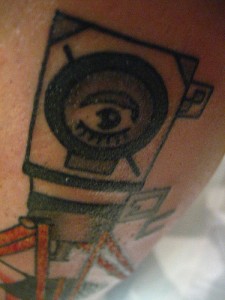June 24, 2009
O.V. High
 I have to thank my friend and colleague Clayfox for comparing (positively) the vibe at this weekend’s fabulous Open Video Conference to High School. The optimism, diversity, and composition of the crowd was really inspiring.
I have to thank my friend and colleague Clayfox for comparing (positively) the vibe at this weekend’s fabulous Open Video Conference to High School. The optimism, diversity, and composition of the crowd was really inspiring.
In some ways, this conference might as well have been called the “Independent Media” conference, but of course, if it was, the right people wouldn’t have attended. Somehow they managed to attract people involved with every layer of the stack needed to create independent media. Subcultures representing hardware, html5, metadata, content, law, production, funders and more were all represented.
To make independent new media, you either need to understand all of these details, or know someone who does. I don’t think I have ever been in a room with this particular blend of expertise and interests before.
The networking was great, and my office was closely involved in making the education stuff at this conference happen (I have a great job). At the conference we announced the liberation of a great piece of software – VITAL is free! Run, VITAL, Run.
The highlight of the talks had to be Amy Goodman’s inspiring speech. I had seen her introduce Chomsky last week, and was left a little bummed out by his talk since it was blow after blow of what’s broken in the world, with very little vision, and no call to action. You don’t hear too many female preachers, but Goodman has really mastered an hypnotic cadence – speeding up to fit in alot of ideas, but slowing down for emphasis. Her soundbytes are eminently tweetable (twitter essentially replaced irc at this conference, and there was an incredibly active backchannel around the #openvideo tag/frequency/channel).
Benkler also opened with fresh material – he has clearly been thinking about journalism in the wake of this year’s collapses (and maybe even our CDPC conference?). It is amusing to think that between Benkler and Moglen (and his metaphorical corollary to Faraday’s law), it might be the sociologically-inclined lawyers who arrive at a theory of creativity (instead of the cognitive scientists). And Zittrain covered for the missing Clay Shirky, and pulled of a funny and intelligent talk.
Many other highlights which I hope to curate once the video is all posted and I have a chance to decompress. I know I should have gone to more talks that I didn’t belong at, but I kept getting pulled in to great conversations…
Kudos to the organizers for pulling off a small miracle. I’ve been to many conferences that cost hundreds of dollars to attend, and don’t even offer lunch. They managed to pull off a beautiful space, food, and even video djs and an open bar.
I wonder to what degree freeculture’s networked proximity to techies and lawyers simplifies some of the logistical nightmares that often plague organizers. It just sems like they are able to organize with relative ease, as the communications media and social capital are intuitive and readily available. Good thing for everyone they are using their super-powers for the greater good 😉
In terms of the longer term, they were consciously trying to create something bigger than a one time event. I was impressed at the purposeful scaffolding of the infrastructure meant to sustain this conversation now that conference is over. Many gatherings only figure out at the event that they want to keep talking afterwards. THe OVC crew did a great job of setting up, and using a wiki, and some sensibly divided mailing lists to seed a healthy after-party.
 Filed by jonah at 12:09 am under earth,ethics,freeculture,water
Filed by jonah at 12:09 am under earth,ethics,freeculture,water
No Comments


